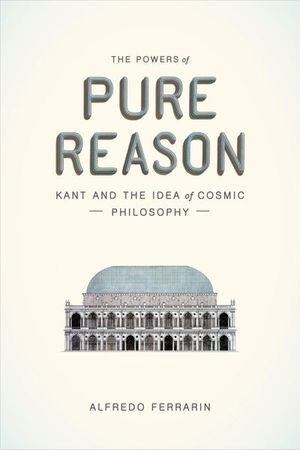The Powers of Pure Reason
Published by The University of Chicago Press
This “highly original account” uncovers “the basic intention(s) animating Kant’s philosophic efforts during the final critical decades of his career” (Notre Dame Philosophical Reviews).
The Critique of Pure Reason—Kant’s First Critique—is one of the most studied texts in intellectual history, but most of that study has focused only on very select parts. Likewise, this work has been held in rigid isolation from Kant’s other Critiques. Working against the standard interpretation that such compartmentalization has produced, Alfredo Ferrarin explores forgotten parts of the First Critique to illuminate an exciting, new, and ultimately central set of concerns by which to read all of Kant’s works.
Ferrarin blows the dust off of two egregiously overlooked sections of the First Critique—the Transcendental Dialectic and the Doctrine of Method. There he discovers what he argues is the Critique’s greatest achievement: a conception of the unity of reason and an exploration of the powers it has to reach beyond itself and legislate over the world.
With this in mind, Ferrarin dismantles the common vision of Kant as writing separately on discreet philosophical topics. Instead, he shows that the three Critiques explore a single underlying theme: the autonomy and teleology of reason, its power and ends. The result is a refreshing new view of Kant, and of reason itself.
The Critique of Pure Reason—Kant’s First Critique—is one of the most studied texts in intellectual history, but most of that study has focused only on very select parts. Likewise, this work has been held in rigid isolation from Kant’s other Critiques. Working against the standard interpretation that such compartmentalization has produced, Alfredo Ferrarin explores forgotten parts of the First Critique to illuminate an exciting, new, and ultimately central set of concerns by which to read all of Kant’s works.
Ferrarin blows the dust off of two egregiously overlooked sections of the First Critique—the Transcendental Dialectic and the Doctrine of Method. There he discovers what he argues is the Critique’s greatest achievement: a conception of the unity of reason and an exploration of the powers it has to reach beyond itself and legislate over the world.
With this in mind, Ferrarin dismantles the common vision of Kant as writing separately on discreet philosophical topics. Instead, he shows that the three Critiques explore a single underlying theme: the autonomy and teleology of reason, its power and ends. The result is a refreshing new view of Kant, and of reason itself.
BUY NOW FROM
COMMUNITY REVIEWS

